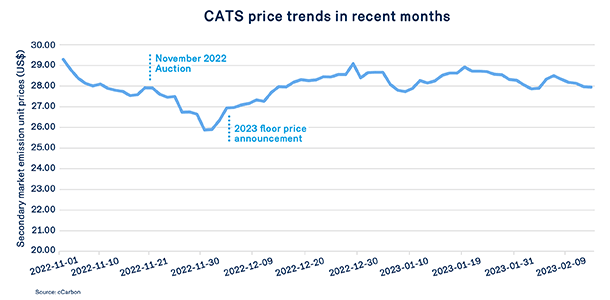Cap and trade system (CATS) price trends in recent months
Global uncertainty in the macroeconomic environment since the start of the war in Ukraine affected the price of emission units in the secondary market throughout 2022.The 2023 auction floor price was announced on December 1, 2022, at USD 22.21 (compared to USD 19.71 for 2022). This price was set by applying a 5% increase plus inflation, as prescribed by the CATS regulation. For the 2023 price, the inflation considered is 7.75%. Remember that the floor price in Canadian dollars is set at each auction according to the exchange rate in effect at the time.
In mid-December 2022, California approved an ambitious climate action plan. This plan includes reducing air pollution, moving away from fossil fuels and increasing the production of various clean energies. California’s key climate targets include a 48% reduction in GHG emissions by 2030 and an 85% reduction by 2045 compared to 1990 levels. This plan could reduce the amount of outstanding emission units or increase the coverage obligations of certain entities, thereby potentially raising prices over the long term.
On December 31, 2022, secondary market prices reflected the impact of inflation and of rising interest rates on the overall economy.
Without any other major specific event in this market, prices continued to be influenced by external factors in January 2023, mainly stock markets.
In early February 2023 and prior to the first auction of the year scheduled for February 15, 2023, prices were in the range of USD 28 or CAD 37.52 at an exchange rate of USD 1.34 for the same period.

Reductions in allocations without charge: new rules in force as of 2024
The updated Regulation Respecting a Cap-and-Trade System for Greenhouse Gas Emissions Allowances (RSPEDE) came into force on September 1, 2022.
One of the key changes is the introduction of new rules to gradually decrease the allocation of emission units without charge for eligible emitters. This new approach is consistent with the Government of Québec’s plan to reduce emission caps and with their 2030 cap target.
As a result, the total volume of units allocated to target emitters without charge will gradually decline starting in 2024, based on several factors that are specific to each industry and institution.
Reducing allocations without charge for the targeted businesses may increase demand to purchase emission allowances on the regulated carbon market, such as during auctions. Implementing energy efficiency initiatives is a good way to limit demand and reduce natural gas consumption and its resulting GHG emissions.
For more information on allocations without charge, industrial emitters can contact the carbon market department at <a href="mailto:The%20updated%20Regulation%20Respecting%20a%20Cap-and-Trade%20System%20for%20Greenhouse%20Gas%20Emissions%20Allowances%20(RSPEDE)%20came%20into%20force%20on%20September%201,%202022.%20%20One%20of%20the%20key%20changes%20is%20the%20introduction%20of%20new%20rules%20to%20gradually%20decrease%20the%20allocation%20of%20emission%20units%20without%20charge%20for%20eligible%20emitters.%20This%20new%20approach%20is%20consistent%20with%20the%20Government%20of%20Quebec%E2%80%99s%20plan%20to%20reduce%20emission%20caps%20and%20with%20their%202030%20cap%20target.%20%20As%20a%20result,%20the%20total%20volume%20of%20units%20allocated%20to%20target%20emitters%20without%20charge%20will%20gradually%20decline%20starting%20in%202024,%20based%20on%20several%20factors%20that%20are%20specific%20to%20each%20industry%20and%20institution.%20%20Reducing%20allocations%20without%20charge%20for%20the%20targeted%20businesses%20may%20increase%20demand%20to%20purchase%20emission%20allowances%20on%20the%20regulated%20carbon%20market,%20such%20as%20during%20auctions.%20%20%20Implementing%20energy%20efficiency%20initiatives%20is%20a%20good%20way%20to%20limit%20demand%20and%20reduce%20natural%20gas%20consumption%20and%20its%20resulting%20GHG%20emissions.%20%20%20%20%20For%20more%20information%20on%20allocations%20without%20charge,%20industrial%20emitters%20can%20contact%20the%20carbon%20market%20department%20at%[email protected]%20%20Eligible%20projects%20for%20the%20use%20of%20money%20from%20deposits:%20guidelines%20and%20conditions%20%20Under%20the%20Regulation%20Respecting%20a%20Cap-and-Trade%20System%20for%20Greenhouse%20Gas%20Emissions%20Allowances%20(RSPEDE)%20updated%20in%20September%202022,%20a%20portion%20of%20the%20emission%20units%20resulting%20from%20the%20reduction%20in%20allocated%20levels%20will%20be%20set%20aside.%20Proceeds%20from%20the%20auction%20of%20these%20units%20will%20be%20reserved%20for%20the%20targeted%20companies%20to%20finance%20climate%20transition%20projects.%20In%20early%20February,%20the%20minist%C3%A8re%20de%20l%E2%80%99Environnement,%20de%20la%20Lutte%20contre%20les%20changements%20climatiques,%20de%20la%20Faune%20et%20des%20Parcs%20(MELCCFP)%20launched%20a%20webpage%20(in%20French%20only)%20detailing%20projects%20that%20the%20targeted%20major%20emitters%20can%20fund%20with%20these%20deposits.%20To%20reserve%20funds%20as%20of%202024,%20emitters%20must%20sign%20an%20agreement%20with%20the%20Ministry%20before%20September%201,%202023.%20%20On%20its%20website,%20MELCCFP%20lists%20the%20various%20stages%20of%20completion%20for%20each%20type%20of%20eligible%20project.%20It%20sets%20out%20the%20conditions%20that%20must%20be%20met%20to%20access%20the%20funds%20reserved%20for%20major%20emitters.%20Eligible%20projects%20include:%20%E2%80%A2Study%20on%20the%20technical%20and%20economic%20potential%20to%20reduce%20greenhouse%20gas%20emissions%20%E2%80%A2GHG%20emission%20reduction%20projects%20%E2%80%A2Technology%20innovation%20projects%20to%20reduce%20GHG%20emissions%20%20Surplus%20operating%20costs%20associated%20with%20converting%20to%20renewable%20natural%20gas%20(RNG)%20are%20eligible%20expenses%20under%20certain%20conditions.%20%20Application%20guidelines%20are%20available%20on%20the%20ministry%E2%80%99s%20website%20(in%20French).%20You%20can%20also%20email%20the%20ministry%20at%[email protected].%20%20
Working togethertowards decarbonization
%20Our%20teams%20are%20always%20available%20to%20discuss%20possible%20solutions%20you%20can%20implement%20to%20prepare%20for%20these%20regulatory%20changes.%20Your%20major%20industries%20advisor%20can%20work%20with%20you%20to%20assess%20different%20scenarios%20to%20reduce%20your%20GHG%20emissions,%20such%20as:%20%E2%80%A2Energy%20efficiency%20measures%20to%20reduce%20your%20natural%20gas%20consumption.%20You%20may%20be%20eligible%20for%20our%20energy%20efficiency%20grants.%20%20%E2%80%A2Replacing%20some%20of%20your%20natural%20gas%20consumption%20with%20RNG.">[email protected]
Eligible projects for the use of money from deposits: guidelines and conditions
Under the Regulation Respecting a Cap-and-Trade System for Greenhouse Gas Emissions Allowances (RSPEDE) updated in September 2022, a portion of the emission units resulting from the reduction in allocated levels will be set aside. Proceeds from the auction of these units will be reserved for the targeted companies to finance climate transition projects.
In early February, the ministère de l’Environnement, de la Lutte contre les changements climatiques, de la Faune et des Parcs (MELCCFP) launched a webpage (in French only) detailing projects that the targeted major emitters can fund with these deposits.
To reserve funds as of 2024, emitters must sign an agreement with the Ministry before September 1, 2023.
On its website, MELCCFP lists the various stages of completion for each type of eligible project. It sets out the conditions that must be met to access the funds reserved for major emitters.
Eligible projects include:
- Study on the technical and economic potential to reduce greenhouse gas emissions
- GHG emission reduction projects
- Technology innovation projects to reduce GHG emissions
Surplus operating costs associated with converting to renewable natural gas (RNG) are eligible expenses under certain conditions.
Application guidelines are available on the ministry’s website (in French). You can also email the ministry at [email protected].
Working together towards decarbonization
Our teams are always available to discuss possible solutions you can implement to prepare for these regulatory changes. Your major industries advisor can work with you to assess different scenarios to reduce your GHG emissions, such as:
- Energy efficiency measures to reduce your natural gas consumption. You may be eligible for our energy efficiency grants.
- Replacing some of your natural gas consumption with RNG.
